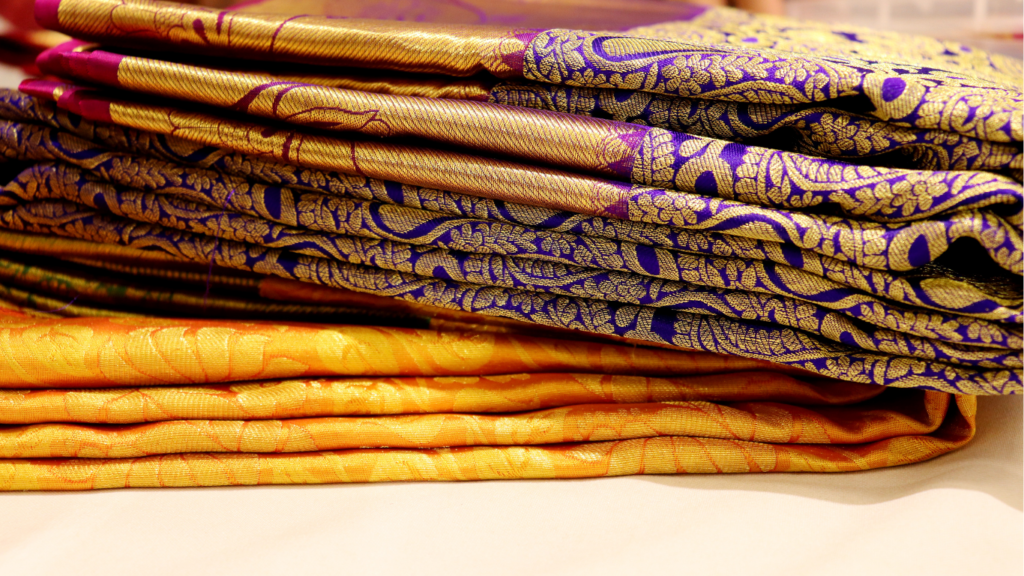Ilkal, a small town in Karnataka’s Bagalkot district, feels like a warm secret tucked away in India’s heart. Famous for its handwoven silk sarees, this place hums with looms, culture, and quiet charm. Picture narrow streets alive with the clack of weaving, temples glowing with devotion, and fields stretching under a big sky. Ilkal’s sarees, with their bold reds and intricate pallus, tell stories of skill passed down for centuries. But there’s more—ancient caves, local festivals, and spicy North Karnataka food make it special.
The Magic of Ilkal Sarees
Ilkal sarees are the town’s heartbeat, woven with love and skill. Known for their silk-cotton blend and vibrant reds, these sarees shine with unique “tope teni” borders and “rasta” pallus, as karnatakatourism.org notes. Handwoven by over 20,000 looms, they carry a GI tag for authenticity. Families like the Patils have woven for generations, their homes buzzing with wooden looms. A single saree takes days, blending silk from Bengaluru and local cotton. Prices start at Rs. 5000, but fakes are common—buy from cooperatives like Ilkal Saree Weavers Society for the real deal. During Deepavali, markets sparkle with new designs, drawing crowds. Tripadvisor reviews praise their elegance but warn about bargaining. Wearing an Ilkal saree feels like wrapping yourself in Karnataka’s pride, each thread a story of tradition and craft that makes this town glow with timeless beauty.
Ilkal’s Rich History and Culture
Ilkal’s story stretches back to the Chalukya dynasty, with roots in the 8th century. The town, once a trade hub, grew around weaving, as per incredibleindia.org. Its name might come from “Ilakallu” (white stone), tied to nearby Badami’s caves. Temples like Hanuman and Mahalingeshwara, built in Chalukyan style, dot the town, buzzing during Shivaratri. The Koli and Devanga weaving communities shape its soul, their festivals like Ugadi filled with folk songs and jowar rotis. Ilkal’s culture blends Hindu and Jain influences, seen in ancient inscriptions near Aihole. Locals are warm, often inviting visitors for chai, though English is rare. Tripadvisor notes the town’s sleepy vibe, perfect for slow travelers. Ilkal’s past and present weave a tapestry of faith, craft, and community, making every visit a step into Karnataka’s living history.
Things to Do in Ilkal
Ilkal offers a mix of craft, faith, and nature. Start at a weaving unit—watch artisans create sarees, maybe try a loom for Rs. 100, guided by locals. Visit Mahalingeshwara Temple for its carved pillars and evening aarti, a serene ritual. Explore Badami Caves (40 km away) for 6th-century rock-cut art, a UNESCO site. Shop at Gandhi Chowk for sarees or taste jolada roti at roadside stalls (Rs. 50). During Ganesh Chaturthi, join street processions with music and modaks. Hire a bike (Rs. 200/day) to roam fields or picnic by the Malaprabha River. Tripadvisor suggests early mornings for cool weather and fewer crowds. Whether you’re praying, shopping, or savoring spicy bhajjis, Ilkal’s simple joys wrap you in its warm, small-town charm, leaving you with memories of a place that feels like home.
Visiting Weaving Units
Stepping into an Ilkal weaving unit is like entering a world of rhythm and color. Small homes in Gandhi Nagar hum with looms, where artisans like Ramesh Devanga weave sarees. For Rs. 100, you can watch or try weaving, feeling the shuttle’s dance, as karnatakatourism.org describes. Tours, often free, explain silk-cotton blending. Book via the Ilkal Saree Weavers Society for authenticity—fakes are a risk, per Tripadvisor. Mornings are best, avoiding heat, and wear comfy clothes for dusty floors. Ask about “chikki” designs for unique patterns. A visit, lasting 1-2 hours, supports weavers and teaches you their craft’s heart. You’ll leave with a deeper love for Ilkal sarees, carrying the clack of looms and artisans’ smiles as a warm memory of this vibrant tradition.
Exploring Nearby Badami Caves
Just 40 km from Ilkal, Badami Caves are a must-see. These 6th-century rock-cut temples, carved by Chalukyas, blend Hindu, Jain, and Buddhist art, earning UNESCO status. Four caves house stunning Vishnu and Shiva carvings, as incredibleindia.org notes. Entry is Rs. 25, with guides at Rs. 200 for stories of ancient kings. Mornings avoid crowds, and comfy shoes help on rocky steps—Tripadvisor warns of slippery patches. The nearby Agastya Lake shimmers below, perfect for photos. Autos from Ilkal cost Rs. 800 round-trip, taking 1 hour. Visit in 2-3 hours, then grab chai at Badami’s stalls. This trip weaves history and beauty into your Ilkal adventure, leaving you awed by Karnataka’s ancient artistry and the caves’ timeless glow.
Planning Your Trip to Ilkal
Ilkal is easy to reach and welcoming for 2025 travelers. Open year-round, it’s 50 km from Bagalkot Railway Station—autos cost Rs. 1000, or buses Rs. 100. Hubli Airport (120 km) connects via taxis (Rs. 2500). October to March is ideal, with cool 20-30°C days; summers hit 40°C, per karnatakatourism.org. Stay at Hotel Shree Lodge (Rs. 1000-2000) near Gandhi Chowk. Carry cash (Rs. 2000-5000) for markets, as cards are rare. Dress modestly for temples, and learn basic Kannada phrases—locals love it. Tripadvisor suggests booking saree tours early. Visit during Deepavali for festive buzz, but book stays ahead. With these tips, your Ilkal trip will be smooth, letting you soak in its sarees, temples, and small-town warmth without a hitch.
How to Get There
Ilkal is a breezy trip from North Karnataka hubs. From Bagalkot Railway Station (50 km), take a bus (Rs. 100, 1.5 hours) or auto (Rs. 1000) to Gandhi Chowk. Trains from Bengaluru (10 hours, Rs. 500) reach Bagalkot, per incredibleindia.org. Hubli Airport (120 km) offers taxis (Rs. 2500, 2.5 hours) via NH50, a scenic drive with sunflower fields. Buses from Hubli (Rs. 150) run hourly. Driving is easy—use GPS for Ilkal’s main road, with parking at Rs. 50. Mornings avoid traffic, and locals help with directions. Tripadvisor recommends early starts for calm roads. The journey, with rural Karnataka’s charm, sets a cozy tone for Ilkal’s temples and looms, making arrival feel like stepping into a warm, woven embrace.
Nearby Attractions
Ilkal pairs well with Karnataka’s treasures. Badami Caves (40 km) stun with ancient carvings (Rs. 25 entry). Aihole (50 km) has 100+ Chalukyan temples, a history buff’s dream (Rs. 20). Pattadakal (60 km), another UNESCO site, boasts 8th-century shrines (Rs. 30). Autos to these cost Rs. 800-1500, per karnatakatourism.org. Try mirchi bhajjis at Badami’s stalls (Rs. 20). Visit Bagalkot’s Rani Chennamma Park (50 km) for a relaxing evening. Morning trips beat heat, and Tripadvisor suggests guides for Aihole’s stories. These spots mix history, faith, and local flavors, making a day trip from Ilkal a rich blend of Karnataka’s past and present, leaving you with a heart full of wonder.
Tips for a Memorable Ilkal Visit
To make your Ilkal trip shine, plan smart. Visit October to March for cool weather, avoiding summer’s heat. Dress modestly—sarees or kurtas—for temples and weaving units. Carry cash (Rs. 2000-5000) for sarees, food, or autos, as ATMs are few. Book weaving tours via Ilkal Saree Weavers Society, and haggle gently at markets—Tripadvisor warns of overpricing. Learn Kannada greetings like “Namaskara” to charm locals. Arrive early for temples or caves to beat crowds. Respect looms—don’t touch without permission. Try local thalis (Rs. 100) but ask for mild flavors if spice isn’t your thing. Check Deepavali dates for festive vibes, booking stays early. Keep phones safe in busy markets. With these tips, Ilkal will wrap you in its woven warmth, leaving you with sarees, stories, and a love for Karnataka’s hidden gem.


